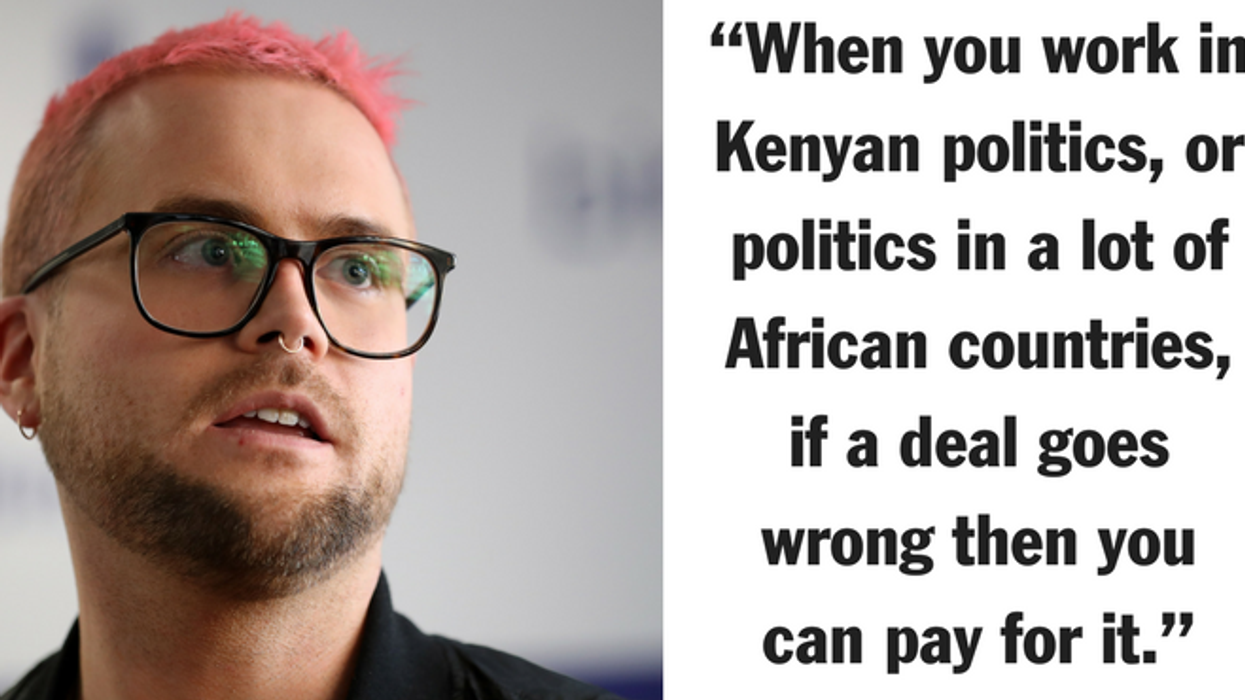Cambridge Analytica analyst-turned-whistleblower Christopher Wylie told British Parliament that the death of his predecessor died under specific circumstances following a botched 2012 deal in Kenya.
In his Tuesday testimony before members of British Parliament, Wylie recalled that his predecessor at Cambridge Analytica, Dan Muresan, was found dead in a hotel room under mysterious circumstances, following his failure to make a deal to work on the Uhuru Kenyatta election campaign in Kenya. Wylie suspects foul play, mainly because police were barred from entering Muresan's hotel room for 24 ours after his death.
"When you work in Kenyan politics, or politics in a lot of African countries, if a deal goes wrong then you can pay for it," Wylie said. "What I heard was that he was working on some kind of deal of some sort...and that a deal went sour...people suspected that he was poisoned in his hotel room. I also heard that the police had got bribed to not enter the hotel room for 24 hours."
Wylie did admit, however, "that is what I was told—I was not there so I speak to the veracity of it."
The 28-year-old former employee of the data analytics company, which is embroiled in a scandal alleging the abuse of user data of 50 million Facebook users during the 2016 presidential election, admitted to The Guardian earlier this month that he designed the algorithms that phished through the networks of Facebook users who took a personality quiz taken by more than 270,000 people.
"Bannon knew."
The data was then used to target voters during the election, with the objective of electing Donald Trump president.
"I made Steve Bannon's psychological warfare tool," Wylie told Carol Cadwalladr of The Guardian. "It's something that I regret...it was a grossly unethical experiment because you're playing with the psychology of an entire country without their consent or awareness. It's insane. The company has created psychological profiles of 230 million Americans. And now they want to work with the Pentagon? It's like Nixon on steroids."
Later in his testimony, Wylie also explained to British lawmakers that Cambridge Analytica's subsidiary, an analytics firm called Aggregate IQ, employed similarly clandestine tactics to influence the outcome of 2016's Brexit vote.
He claims that the firm targeted seven million voters in the United Kingdom, and that the 40 million British Pounds paid to Aggregate IQ for the operation by the Vote Leave campaign violated campaign spending laws.
"I think it is completely reasonable to say there could have been a different outcome in the referendum had there not been, in my view, cheating," Wylie said. "You have a wealthy company from a developed nation going into an economy or democracy that's still struggling to get its feet on the ground—and taking advantage of that to profit from that."
"They don't care whether or not what they do is legal as long as they get the job done."
Public outrage over the data breach, which is far from Facebook's first, has been escalating in recent weeks. After United States and international intelligence agencies determined Russian trolls used Facebook to spread fake news and influence voters in the 2016 presidential election, little appears to have been done to protect the data of the nearly 2.2 billion Facebook users worldwide.
On Wednesday morning, Facebook Founder and CEO Mark Zuckerburg agreed to testify before Congress as inquiries mount surrounding Facebook's multiple failures to protect the personal data of its users.














 @DuncanCecil/X
@DuncanCecil/X @@realDonaldTrump/Truth Social
@@realDonaldTrump/Truth Social @89toothdoc/X
@89toothdoc/X @xray_media/X
@xray_media/X @CHRISTI12512382/X
@CHRISTI12512382/X
 @sza/Instagram
@sza/Instagram @laylanelli/Instagram
@laylanelli/Instagram @itssharisma/Instagram
@itssharisma/Instagram @k8ydid99/Instagram
@k8ydid99/Instagram @8thhousepath/Instagram
@8thhousepath/Instagram @solflwers/Instagram
@solflwers/Instagram @msrosemarienyc/Instagram
@msrosemarienyc/Instagram @afropuff1/Instagram
@afropuff1/Instagram @jamelahjaye/Instagram
@jamelahjaye/Instagram @razmatazmazzz/Instagram
@razmatazmazzz/Instagram @sinead_catherine_/Instagram
@sinead_catherine_/Instagram @popscxii/Instagram
@popscxii/Instagram
